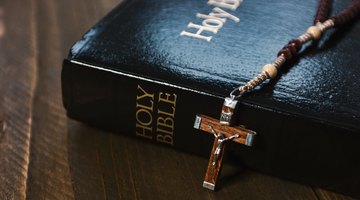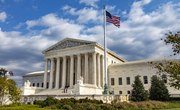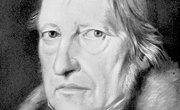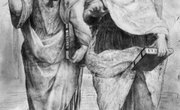Christians and critics hotly debate how the Bible influenced the U.S. Constitution. Secularists argue that contrary to popular opinion, the Founding Fathers were "deists" at best and never intended any religious influence in matters of government. Many Christians counter that while there were certainly theological differences and variations in the level of Christian commitment between the men who framed the Constitution, the principles upon which it is founded reveal foundational assumptions of a Christian worldview, even though the document does not explicitly refer to God nor the Bible. A look at the words of the Constitutional Convention delegates themselves provides insight into how their thinking was influenced by the Bible and Christian principles when framing the laws of the new nation.
Founding Fathers' Worldview
The laws set forth in the U.S. Constitution did not emerge out of a moral vacuum unrelated to the writers' own beliefs, but rather are the product of the reasonings of those who created it. By their own words, the Founding Fathers were not neutral on the question of religion as the basis of government and society.
For example, in a letter to the Officers of the First Brigade of the Third Division of the Militia of Massachusetts, John Adams writes, "Our Constitution was made only for a moral and religious people. It is wholly inadequate to the government of any other."
Noah Webster stated, "The moral principles and precepts contained in the scriptures ought to form the basis of all our civil constitutions and laws. All the miseries and evils which men suffer from vice, crime, ambition, injustice, oppression, slavery, and war, proceed from their despising or neglecting the precepts contained in the Bible."
Delegate Governor Morris of Pennsylvania forthrightly professed, "I believe that religion is the only solid base of morals, and that morals are the only possible support of free governments. Therefore education should teach the precepts of religion and the duties of man towards God."
Origins of Constitutional Law
While the Constitution does not explicitly refer to God, the concepts of law which it contains stem from the cultural assumptions of basic biblical truths widely held by the people of that time regardless of their actual piety towards God. In other words, it is an inarguable fact that not all Americans of that era actually held to the Christian faith, yet they held to the commonly accepted morals, ethics and standards of behavior derived from English Common Law, which drew from biblical law given to the Hebrews by God.
Underlying Biblical Principles
The rule of law laid out in the Constitution descends from the Ten Commandments. As they suffered at the hands of corrupt human authorities, the Constitutional delegates were aware of the flawed nature of human beings as shown in Genesis 3 and Jeremiah 17:9. Thus, they designed a system of checks and balances and separation of powers to prevent one individual or group from abusing the citizens through self-serving power ploys.
The three branches of government are reminiscent of the roles of God as described in Isaiah 33:22. The exception for Sundays in the time limit for the president to sign a bill into law in Article VII, Section 2 hints at the assumption that Sunday was a day of rest as set forth in Exodus 20.
Exodus 18 reveals that before Israel demanded that God give them a king, the Hebrews had a representative form of republican government, not unlike the system created in the Constitution.
Both Leviticus 19:34 and Article 1, Section 8 of the Constitution require uniform treatment of immigrants. Deuteronomy 17:15 warns the Hebrews not to let a foreigner rule over them just as the Constitution requires the president to be a natural born citizen of the U.S.
The requirement in Article III Section 3 to establish guilt in cases of treason by the testimony of at least two witnesses recalls the biblical instruction in Deuteronomy 17:6 to have the testimony of two or three witnesses before putting a man to death.
Separation of Church and State
Contrary to the popular conception of many, the words "separation of church and state" do not actually appear in the U.S. Constitution. The sole reference to religion in the Constitution is Article VI, Section 3, "...no religious Test shall ever be required as a qualification to any office or public trust under the United States."
The Bill of Rights was added later to include First Amendment protections, "Congress shall make no law respecting an establishment of religion, or prohibiting the free exercise thereof." Critics argue that these words indicate the Founding Fathers wanted to establish an entirely secular form of government, wholly uninfluenced by religion of any stripe.
Christians point out, however, that the many writings of the early Americans in the era of the birth of the Constitution contain numerous quotations and ideas which can be traced back to a biblical source. They assert that the Constitutional delegates so took for granted the necessity of a biblical foundation for government that they would not have conceived of conducting government completely removed from any influence of religion. Rather, they wanted to make sure that government could never again interfere with or oppress religious freedoms or establish one Christian denomination over another as the religion of state to the detriment of all others.
Related Articles
References
Writer Bio
Tamara Christine has written more than 900 articles for a variety of clients since 2010. She holds a Bachelor of Arts in applied linguistics and an elementary teaching license. Additionally, she completed a course in digital journalism in 2014. She has more than 10 years experience teaching and gardening.











